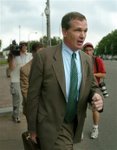Olympic challenge
March 12, 2007
What Chicago officials are calling "layers" securing taxpayers against a funding shortfall at the 2016 Olympic Games are actually revenue associated with the games themselves and the goodness of donors' hearts.
With no third party having yet stepped up to guarantee against an operating deficit, the Chicago 2016 bid committee's first line of protection is a projected $525-million operating surplus, city and bid committee officials announced Friday.
Its second protective layer is $200 million that the committee hopes to raise from the sale of luxury suites and from proceeds from the Olympic Village along the lakefront. As a third backstop, Olympics bid Chairman Patrick Ryan vowed he would redouble private fundraising efforts. But that carries the risk of crowding out donations to other non-profit groups, says one philanthropic expert.
After that, city taxpayers would be on the hook for as much as $500 million, depending on whether as-yet-unnamed private guarantees or "other public funds" come through, Mr. Ryan says. Games promoters would also buy insurance against catastrophes, such as a terrorist attack.
'WRAPPED IN CERTAINTY'
Dana Levenson, the city's chief financial officer, reiterated Friday that the city's exposure to a deficit would be "practically nonexistent."
But whether the operating books are written in red or black depends heavily on a proposed $366-million stadium being built on budget — something Olympics boosters say is a near certainty but some outside observers doubt.
More than 86% of the funding for the centerpiece stadium is to come from operating revenue — sales of tickets, television rights and sponsorships.
Mr. Ryan on Friday said the temporary stadium's cost estimate was vetted by three private firms and includes 15% for contingencies and that the design uses less steel and concrete, minimizing the risk of rising costs.
"We believe we have the stadium wrapped in certainty and conveyed this confidence to the U.S. Olympic Committee," Mr. Ryan says.
But as sports stadium consultant Marc Ganis notes, such plans and budgets almost never remain unchanged.
"There's virtually no chance of projecting the price of a facility that will open nine years from now," says Mr. Ganis, president of Chicago's Sportscorp Ltd. "What you can do now is provide your best estimates and hope that you're within a range and work within that range. But will it be different? Of course it will be different."
Says Allen Sanderson, an economist at the University of Chicago: "The temporary stadium is not going to come in at $300 or $400 (million) — it's going to be $700 (million) or a billion. Who's going to be liable for that?" He cites Millennium Park and the Dan Ryan Expressway reconstruction as examples of projects with cost overruns.
Mr. Ryan, whose committee has already raised more than $30 million to pursue an international campaign for the games, said he'd seek to raise more funds from private donors to limit the city's exposure.
"We plan on continuing to raise private funds to increase the value of this layer to further distance the city from risk," says Mr. Ryan, who did not provide the games' total revenue projection.
That's a prospect some non-profits are worried about, says fundraising consultant Greg Simoncini, vice-president at Scofield Co. in Chicago.
"I would say that the organizations that receive money from individuals, corporations and foundations should be protected if raising money from those sources is going to be one of the ways the city guarantees it can support the games," he says.
March 12, 2007
What Chicago officials are calling "layers" securing taxpayers against a funding shortfall at the 2016 Olympic Games are actually revenue associated with the games themselves and the goodness of donors' hearts.
With no third party having yet stepped up to guarantee against an operating deficit, the Chicago 2016 bid committee's first line of protection is a projected $525-million operating surplus, city and bid committee officials announced Friday.
Its second protective layer is $200 million that the committee hopes to raise from the sale of luxury suites and from proceeds from the Olympic Village along the lakefront. As a third backstop, Olympics bid Chairman Patrick Ryan vowed he would redouble private fundraising efforts. But that carries the risk of crowding out donations to other non-profit groups, says one philanthropic expert.
After that, city taxpayers would be on the hook for as much as $500 million, depending on whether as-yet-unnamed private guarantees or "other public funds" come through, Mr. Ryan says. Games promoters would also buy insurance against catastrophes, such as a terrorist attack.
'WRAPPED IN CERTAINTY'
Dana Levenson, the city's chief financial officer, reiterated Friday that the city's exposure to a deficit would be "practically nonexistent."
But whether the operating books are written in red or black depends heavily on a proposed $366-million stadium being built on budget — something Olympics boosters say is a near certainty but some outside observers doubt.
More than 86% of the funding for the centerpiece stadium is to come from operating revenue — sales of tickets, television rights and sponsorships.
Mr. Ryan on Friday said the temporary stadium's cost estimate was vetted by three private firms and includes 15% for contingencies and that the design uses less steel and concrete, minimizing the risk of rising costs.
"We believe we have the stadium wrapped in certainty and conveyed this confidence to the U.S. Olympic Committee," Mr. Ryan says.
But as sports stadium consultant Marc Ganis notes, such plans and budgets almost never remain unchanged.
"There's virtually no chance of projecting the price of a facility that will open nine years from now," says Mr. Ganis, president of Chicago's Sportscorp Ltd. "What you can do now is provide your best estimates and hope that you're within a range and work within that range. But will it be different? Of course it will be different."
Says Allen Sanderson, an economist at the University of Chicago: "The temporary stadium is not going to come in at $300 or $400 (million) — it's going to be $700 (million) or a billion. Who's going to be liable for that?" He cites Millennium Park and the Dan Ryan Expressway reconstruction as examples of projects with cost overruns.
Mr. Ryan, whose committee has already raised more than $30 million to pursue an international campaign for the games, said he'd seek to raise more funds from private donors to limit the city's exposure.
"We plan on continuing to raise private funds to increase the value of this layer to further distance the city from risk," says Mr. Ryan, who did not provide the games' total revenue projection.
That's a prospect some non-profits are worried about, says fundraising consultant Greg Simoncini, vice-president at Scofield Co. in Chicago.
"I would say that the organizations that receive money from individuals, corporations and foundations should be protected if raising money from those sources is going to be one of the ways the city guarantees it can support the games," he says.




1 comment:
Anyone know how Macy's got to be the only store that is selling 2016 Olympics T-shirts?
Post a Comment